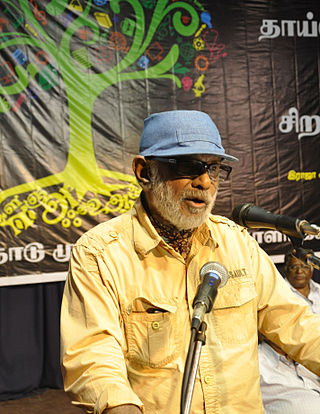
Balanathan Benjamin Mahendran, commonly known as Balu Mahendra, cinematographer, director, screenwriter and film editor who worked in various Indian film industries, primarily in Tamil and Malayalam cinema. Born in Sri Lanka, Mahendran developed a passion for photography and literature at a young age, after witnessing the shoot of David Lean's The Bridge on the River Kwai (1957) during a school trip in Sri Lanka, he was drawn towards filmmaking. After graduation he joined as an Aerial photographer in the Sri Lankan Government. In 1966, he moved to India and gained admission to the Film and Television Institute of India (FTII) to pursue a course in motion picture photography. Upon completion of his diploma, he entered Malayalam cinema as a cinematographer in the early 1970s.
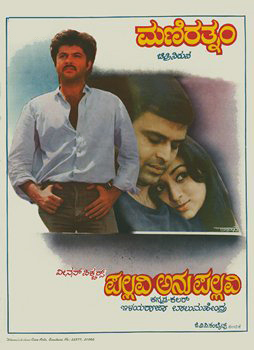
Pallavi Anu Pallavi is a 1983 Indian Kannada-language romantic drama film written and directed by Mani Ratnam in his debut. The film stars Anil Kapoor, Lakshmi, and Kiran Vairale. It revolves around a young man falling in love with a slightly older woman. The music was composed by Ilaiyaraaja, while cinematography was handled by Balu Mahendra. The film is also Kapoor's debut in Kannada cinema.

Moondram Pirai is a 1982 Indian Tamil-language romantic drama film written, directed and filmed by Balu Mahendra. The film stars Kamal Haasan and Sridevi, while Y. G. Mahendran, Silk Smitha and Poornam Viswanathan played supporting roles. It revolves around a school teacher who rescues a woman with retrograde amnesia, from a brothel, and protects her in his house located in Ketti. The rest of the film shows how the woman recovers her memory with the teacher's help.

South Asian cinema refers to the cinema of Afghanistan, Bangladesh, Bhutan, India, Maldives, Nepal, Pakistan and Sri Lanka. The broader terms Asian cinema, Eastern cinema and Oriental cinema in common usage often encompass South Asia as well as East Asia and Southeast Asia.

Mohan is an Indian actor, known for his works predominantly in Tamil cinema. He has also acted in some Telugu, Kannada and Malayalam films. Mohan is also known as "Kokila Mohan" after his debut film Kokila (1977), and "Mic Mohan" from numerous roles playing singers using microphones. In 1982, he received the Filmfare Award for Best Tamil Actor for his work in Payanangal Mudivathillai.

The Filmfare Best Director Award is given by the Filmfare magazine as part of its annual Filmfare Awards South for Tamil (Kollywood) films. The awards were extended to "Best Director" in 1972.
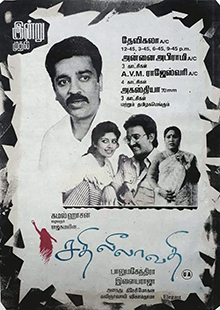
Sathi Leelavathi is a 1995 Indian Tamil-language comedy film directed, co-written, photographed and edited by Balu Mahendra. The film stars Ramesh Aravind, Kalpana and Heera, with Kovai Sarala and Kamal Haasan in supporting roles. It revolves around Arun (Aravind) who, unhappy with his wife Leelavathi's (Kalpana) plain looks and weight, engages in an extramarital affair with Priya (Heera).

Maria My Darling is a 1980 Indian action thriller film directed by Durai and starring Kamal Haasan and Sripriya. The film, a bilingual, was shot in Tamil and Kannada languages.

Meendum Kokila is a 1981 Indian Tamil-language romantic comedy film directed by G. N. Rangarajan from a screenplay written by Ananthu and story by Haasan Brothers. The film stars Kamal Haasan and Sridevi. Deepa, M. Krishnamoorthy, Thengai Srinivasan and Omakuchi Narasimhan are featured in supporting roles. The narrative follows a young woman who fights to win back her husband after his infatuation with an actress.
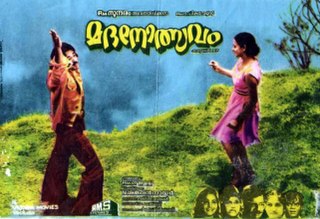
Madanolsavam is a 1978 Indian Malayalam-language romantic drama film written and directed by N. Sankaran Nair and starring Kamal Haasan, Jayan and Zarina Wahab. Dialogues and comedy scenes were written by Thoppil Bhasi. The film was partially remade in Telugu-language as Amara Prema by T. Rama Rao with Kamal and Zarina reprising their roles from the original. The film was dubbed into Tamil as Paruva Mazhai and into Hindi as Dil Ka Sathi Dil. The film is an unofficial remake of an English movie named Lovestory (1970).
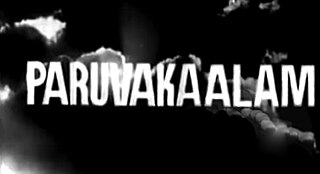
Paruva Kaalam is a 1974 Indian Tamil-language film, directed by Jos A. N. Fernando, written by A. S. Prakasam, starring Srikanth, Roja Ramani, Kamal Haasan, Nagesh and Prameela. Roja Ramani paired up with Kamal Haasan for the first time. It is a remake of the 1972 Malayalam-language film Chemparathy.
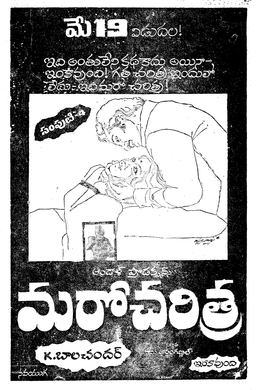
Maro Charitra is a 1978 Indian Telugu-language romantic tragedy film written and directed by K. Balachander. It stars Kamal Haasan and Saritha in the lead with Madhavi appearing in prominent roles. The film deals with cross-cultural romance between a Tamil man and a young Telugu woman. Upon release, it was commercially successful and remains a cult classic. Owing to its success in Andhra Pradesh, the film was released in the neighbouring states of Tamil Nadu and Karnataka without being dubbed into the respective languages. It held the record of being the longest-running Telugu film at theatres in Tamil Nadu and Karnataka. Across theatres it had an uninterrupted theatrical run of 2+1⁄2 years in Bangalore. The song Ye Theega Poovuno became popular.
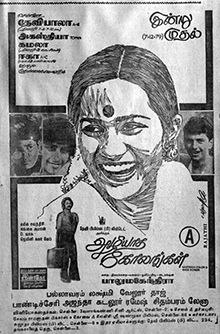
Azhiyatha Kolangal is a 1979 Indian Tamil-language coming-of-age drama film, directed by Balu Mahendra. It stars Shoba and Pratap Pothen. Kamal Haasan played a guest role in the film. The film was Mahendra's second directorial venture and his first in Tamil. Partly autobiographical, the film dealt with the events that happen during the adolescence of three friends who live in a small village. In addition to directing the film, Balu Mahendra wrote the screenplay and shot the film.
The Vijay for Best Director is given by STAR Vijay as part of its annual Vijay Awards ceremony for Tamil (Kollywood) films.
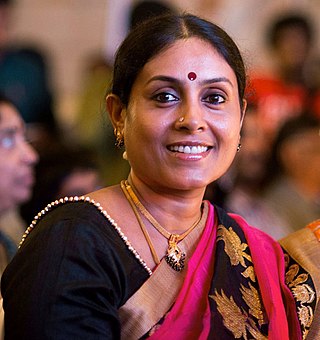
Saranya Ponvannan is an Indian actress who predominantly appears in Tamil, Telugu, and Malayalam and a few Kannada language films. She also acted in one Hindi movie Chup: Revenge of the Artist in 2022. Saranya made her acting debut in a lead role in Mani Ratnam's Nayakan (1987) and went on to play lead roles from 1987 to 1996. Following an eight-year sabbatical, she returned to films in 2003 as a character actor roles. In her career spanning around over 25 years she had won a number of accolades including one National Film Award, two Tamil Nadu State Film Awards and five Filmfare Award South.

Sommokadidhi Sokokadidhi is a 1979 Indian Telugu-language action comedy film directed by Singeetam Srinivasa Rao. Kamal Haasan plays a double role as an honest doctor and a happy-go-lucky youth. He was paired with Jayasudha and Roja Ramani. Prabhakar Reddy, Sarathi, Pandari Bai, Kanta Rao, Ramaprabha and C. S. Rao play supporting roles. This was the first film of Singeetam Srinivasa Rao and Kamal Haasan together.
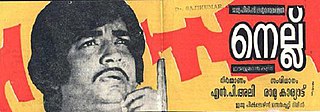
Nellu (transl. Paddy) is a 1974 Malayalam-language drama film directed by Ramu Kariat from a screenplay by K. G. George based on the 1972 award-winning novel of the same name by P. Valsala. It features an ensemble cast of Prem Nazir, Jayabharathi, Thikkurissy Sukumaran Nair, Sankaradi and Kottarakkara Sreedharan Nair. The film portrays the life of the Adiyar community, a tribe of the forests in the Wayanad hills of Kerala, through the eyes of an outsider.

Ooma Kuyil is a 1983 Indian Malayalam-language film directed by Balu Mahendra and produced by Joseph Abraham. The film stars Y. Gee. Mahendra, Aruna and Poornima Jayaram. The film has a musical score by Ilaiyaraaja. The film is a remake of the director's own debut film Kokila, made in Kannada.
The 26th Filmfare Awards South ceremony honoring the winners of the best of South Indian cinema in 1978 was an event held on 10 June 1979 at Kalaivanar Arangam in Madras.
G. N. Rangarajan was an Indian writer, producer and director who worked in Tamil cinema.

















